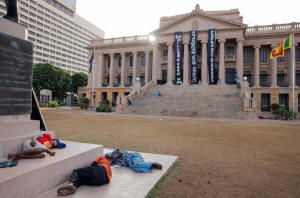Sri Lanka's ousted president says he 'took all possible steps' to
prevent crisis
 Send a link to a friend
Send a link to a friend
 [July 16, 2022]
By Uditha Jayasinghe and Devjyot Ghoshal [July 16, 2022]
By Uditha Jayasinghe and Devjyot Ghoshal
COLOMBO (Reuters) -Sri Lanka’s ousted
president Gotabaya Rajapaksa, who fled overseas this week to escape a
popular uprising against his government, has said he took "all possible
steps" to avert the economic crisis that has engulfed the island nation.
Rajapaksa's resignation was accepted by parliament on Friday. He flew to
the Maldives and then to Singapore after hundreds of thousands of
anti-government protesters came out on the streets of Colombo a week ago
and occupied his official residence and offices.
Sri Lanka's parliament met on Saturday to begin the process of electing
a new president, as a shipment of fuel arrived to provide some relief to
the crisis-hit nation.
During the proceedings Dhammika Dasanayake, the secretary general of Sri
Lanka’s parliament, formally read out Rajapaksa’s resignation letter,
the contents of which have not previously been made public.
In his letter Rajapaksa said Sri Lanka’s financial crisis was rooted in
years of economic mismanagement that pre-dated his presidency, along
with the COVID-19 pandemic that drastically reduced Sri Lanka’s tourist
arrivals and remittances from foreign workers.

"It is my personal belief that I took all possible steps to address this
crisis, including inviting parliamentarians to form an all-party or
unity government," the letter said.
Parliament will next meet on Tuesday to accept nominations for the post
of the president. A vote to decide the country's leader is set to take
place on Wednesday.
Six-time prime minister Ranil Wickremesinghe, an ally of the Rajapaksas
who is the sole representative of his party in parliament, has been
sworn in as acting president until then.
Wickremesinghe, who protesters want gone too, was selected as the ruling
party's candidate for president on Friday, leading to the prospect of
further unrest should he be elected.
[to top of second column]
|

Demonstrators sleep at the Presidential Secretariat after Parliament
Speaker Mahinda Yapa Abeywardena officially announced the
resignation of president Gotabaya Rajapaksa who fled to Singapore
amid Sri Lanka's economic crisis, in Colombo, Sri Lanka, July 15,
2022. REUTERS/Dinuka Liyanawatte

The opposition's presidential nominee is Sajith
Premadasa, while the potential dark horse is senior ruling party
lawmaker Dullas Alahapperuma.
Over 100 police and security personnel with assault rifles were
deployed on the approach road to parliament on Saturday, manning
barricades and a water cannon to prevent any unrest. Columns of
security forces patrolled another approach road to parliament,
though there were no signs of any protesters.
Street protests over Sri Lanka's economic meltdown simmered for
months before boiling over on July 9, with protesters blaming the
Rajapaksa family and allies for runaway inflation, shortages of
basic goods, and corruption.
Days-long fuel queues have become the norm in the island nation of
22 million, while foreign exchange reserves have dwindled to close
to zero and headline inflation hit 54.6% last month.
Sri Lanka received the first of three fuel shipments on Saturday,
Energy Minister Kanchana Wijesekera said. These are the first
shipments to reach the country in about three weeks.
A second diesel consignment will also arrive on Saturday, with a
shipment of petrol due by Tuesday.
"Payments completed for all 3," the minister said in a tweet.
(Reporting by Uditha Jayasinghe and Devjyot Ghoshal in Colombo
Writing by Alasdair Pal; Editing by Raju Gopalakrishnan)
[© 2022 Thomson Reuters. All rights
reserved.]
This material may not be published,
broadcast, rewritten or redistributed.
Thompson Reuters is solely responsible for this content.
 |